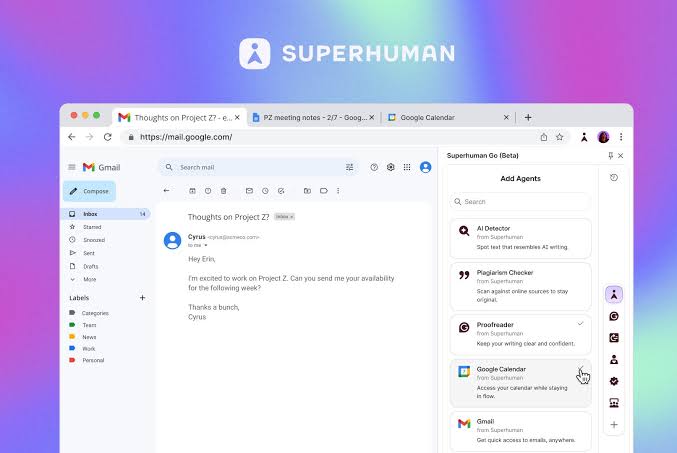







































Grammarly rebrands as Superhuman, uniting its AI tools under one brand
 AI
AI
 SUITE
SUITE
Grammarly, the AI writing assistant that became a staple for millions of professionals and students worldwide, has announced a bold new chapter in its evolution. The company revealed today that it is officially changing its name to Superhuman, marking a major transformation into an AI-native productivity powerhouse.
The announcement signals one of the biggest rebranding moves in the AI productivity sector this year. The new identity unites Grammarly, Coda, and Superhuman Mail under one unified brand, Superhuman, with a mission to “unlock the superhuman potential in everyone.”
According to the company, the new name and structure reflect its broader vision beyond writing assistance. Superhuman now aims to serve as a comprehensive platform that integrates AI agents and productivity apps to help users work faster, smarter, and more efficiently.
Launched in 2019, Grammarly revolutionises writing by offering real-time grammar correction and stylistic feedback powered by natural language processing. Over time, the company expanded into tone detection, rewriting tools, and generative AI features.
But the landscape has changed dramatically in the past two years. The rise of generative AI tools like ChatGPT, Google Gemini, and Anthropic’s Claude has reshaped how people write, communicate, and collaborate. Grammarly’s leadership realised that to remain relevant and competitive, it needed to evolve beyond text correction into something far more powerful.

The rebrand to Superhuman signals that shift. It represents an AI-native ecosystem that goes beyond words to encompass productivity, creativity, and automation across applications.
In a statement, the company said, “The new Superhuman unites the best of Grammarly, Coda, and Superhuman Mail into a single AI platform. Our mission is simple: to make AI easier to use so that everyone can work better and faster.”
Superhuman will now serve as the umbrella brand for all its products, offering users seamless integration between writing, collaboration, and communication tools.
Grammarly to Superhuman: What’s changing and what’s next?
Under the new Superhuman brand, users can expect three main pillars:
- Superhuman Suite – A collection of productivity tools powered by AI, designed to simplify workflows across writing, communication, and data organisation.
- Superhuman Mail – A reimagined email experience that blends intelligent automation with human-like assistance, building on the success of the original Superhuman app.
- Superhuman Go – A new offering that connects users with AI agents capable of automating routine digital tasks across various platforms.
The rebranding also consolidates teams and technologies from Grammarly, Coda, and Superhuman Mail, enabling deeper collaboration and innovation under one vision.

While the company has not yet confirmed whether the Grammarly name will continue to exist as a sub-brand, industry insiders expect it to transition into “Superhuman Writing”, maintaining its strong recognition while aligning with the unified identity.
The move is part of a growing trend among AI firms to merge multiple tools into a single, cohesive ecosystem. Similar strategies have been seen from players like Notion, Anthropic, and OpenAI, which are building AI platforms that integrate across writing, research, and productivity applications.
Superhuman’s leadership team believes that unifying under one name will help users better understand its evolving capabilities. “This isn’t just a rebrand,” the company said. “It’s a redefinition of what it means to be productive in the age of AI.”
Why the rebrand matters
For years, Grammarly has been synonymous with writing assistance. Its browser extensions, desktop apps, and integrations served over 30 million users globally. The brand became so embedded in daily digital communication that its name became a verb, “I’ll Grammarly this before I send it.”
But as the boundaries between writing, communication, and productivity blur, Grammarly’s core value proposition is increasingly overlapping with other AI tools. By rebranding to Superhuman, the company positions itself as more than a writing assistant; it becomes an orchestrator of digital work.
The inclusion of Coda, a collaborative document platform, and Superhuman Mail, the high-speed email app favoured by tech professionals, reinforces this shift. Together, they form a suite that connects text, communication, and data through AI.
Analysts say the move could make Superhuman a major contender against AI-native productivity platforms such as Notion AI, Microsoft Copilot, and Google Workspace AI. By combining its linguistic expertise with automation and workflow intelligence, Superhuman could become a go-to platform for hybrid professionals who rely on multiple tools to manage their daily tasks.
Superhuman’s promise to “make AI easier to use” suggests a future where users won’t need to switch between multiple apps or interfaces. Instead, AI agents embedded in Superhuman’s platform could anticipate needs, summarise information, draft documents, manage communication, and even execute tasks autonomously.

The company has not yet disclosed specific pricing or release dates for its newly unified services. However, its announcement hints at upcoming launches under the Superhuman Suite and Superhuman Go, likely designed to integrate smoothly with existing enterprise tools.
The brand also unveiled a refreshed visual identity, featuring a minimalist design and vibrant tones to reflect its “human-meets-machine” philosophy.
While some long-time Grammarly users may need time to adjust to the new name, the shift could mark one of the most strategic moves in the AI productivity race. Superhuman is betting on a future where people don’t just write better but work smarter, think faster, and operate with augmented intelligence at every step.
As Superhuman put it in its launch statement: “AI should empower people, not replace them. Our mission is to unlock the superhuman potential in everyone.”

